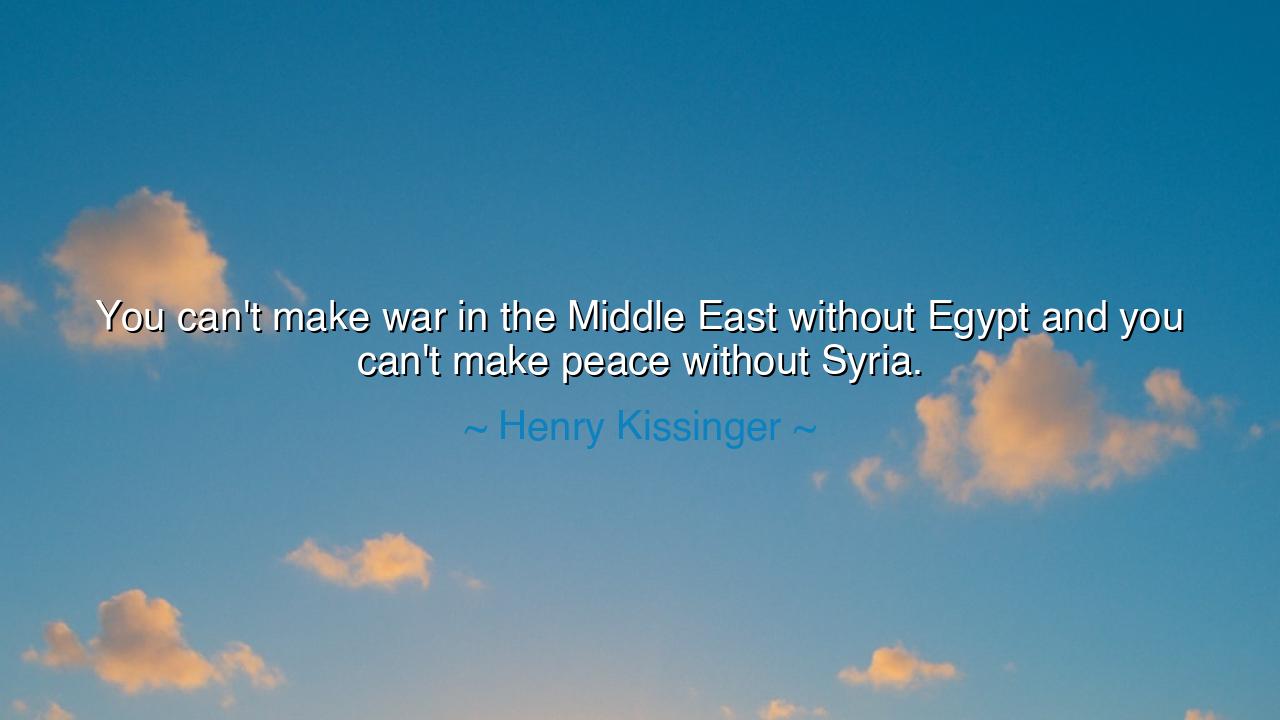
You can't make war in the Middle East without Egypt and you
You can't make war in the Middle East without Egypt and you can't make peace without Syria.






Henry Kissinger, the architect of delicate balances and weary student of power, once declared: “You can’t make war in the Middle East without Egypt and you can’t make peace without Syria.” In this saying, he captured the essence of a region where geography, history, and destiny intertwine like threads in an unbreakable knot. His words are not casual, but forged from the fire of diplomacy, from years of walking among leaders where one misstep could bring either war or peace.
When Kissinger spoke of Egypt, he recognized it as the heart of the Arab world, a nation whose size, culture, and armies carried weight far beyond its borders. In the wars against Israel, Egypt was always the spearhead, the decisive force without which the march of war could not be sustained. To rally Egypt was to rally the Arab cause; to lose Egypt was to weaken it beyond repair. Thus, in his wisdom, Kissinger marked Egypt as the key to war, the giant whose shadow stretched across the Middle East.
But when he turned to Syria, his tone shifted. For Syria was not the mightiest of armies, nor the largest of lands, yet it was the fulcrum of legitimacy, the gatekeeper of lasting resolution. Without Syria’s consent, any peace would be fragile, contested, and incomplete. In the wars of 1967 and 1973, Syrian forces stood alongside Egypt, but their land—especially the Golan Heights—remained one of the most bitter points of contention. Kissinger knew that unless Syria’s grievances were addressed, the peace would always be fragile, like glass poised to shatter. Thus, he proclaimed: peace without Syria is no peace at all.
History confirmed his insight. After the Yom Kippur War of 1973, Egypt under Anwar Sadat chose a daring new path: reconciliation with Israel. The Camp David Accords of 1978 brought Egypt into peace, the first Arab nation to do so, altering the balance of the region forever. War could no longer be waged as before, for the great lion of the Arab armies had laid down its sword. Yet though peace between Egypt and Israel endured, conflict still simmered in Lebanon, in Palestine, and along the Golan, for Syria remained outside the accord. Kissinger’s words were vindicated: war without Egypt was impossible, but peace without Syria remained incomplete.
The ancients too saw such truths in the patterns of nations. Thucydides wrote that war was not only fought with weapons but with alliances and legitimacy. In Greece, to hold Athens was to wield influence; to reconcile Sparta was to secure peace. In the same way, Kissinger’s maxim is more than about Egypt and Syria—it is about the deeper principle that some nations embody the power to ignite war, while others hold the keys to reconciliation. The wisdom of a statesman lies in discerning who holds which key.
The deeper meaning of this quote lies beyond geography. It is a reminder that in any conflict, there are powers that fuel the fire and others that can quench it. To achieve peace, one must not only silence the strongest armies, but also address the deepest wounds. Egypt could withdraw its legions, but Syria carried the scar of territory lost and pride wounded. Without healing such scars, peace is not true peace, but merely a pause before another storm.
So, O listener, take Kissinger’s words as a lesson beyond the Middle East: know that every struggle, whether among nations, communities, or families, has its Egypts and its Syrias—those who can stir war with their might, and those whose reconciliation is necessary for true harmony. If you would be a peacemaker, do not only seek to halt the warrior, but also to comfort the wounded, to bring dignity where it has been denied. Only then will peace endure, not as fragile parchment, but as living stone.
Thus the teaching remains: “You can’t make war in the Middle East without Egypt and you can’t make peace without Syria.” Learn from it the wisdom of balance, the necessity of justice, and the truth that peace requires more than silence—it requires inclusion, healing, and respect. This is the way of the wise, the way of the ancients, and the path that alone can turn conflict into concord.






AAdministratorAdministrator
Welcome, honored guests. Please leave a comment, we will respond soon